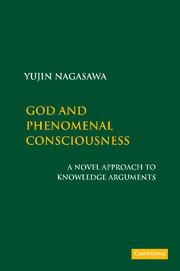Book contents
- Frontmatter
- Contents
- Preface
- PART I THE STRUCTURE OF KNOWLEDGE ARGUMENTS
- PART II KNOWLEDGE ARGUMENTS IN THE PHILOSOPHY OF RELIGION
- PART III KNOWLEDGE ARGUMENTS IN THE PHILOSOPHY OF MIND
- 5 Nagel's Bat Argument
- 6 Jackson's Mary Argument (1)
- 7 Jackson's Mary Argument (2)
- PART IV KNOWLEDGE ARGUMENTS AND NONTHEORETICAL PHYSICALISM
- References
- Index
6 - Jackson's Mary Argument (1)
Published online by Cambridge University Press: 23 July 2009
- Frontmatter
- Contents
- Preface
- PART I THE STRUCTURE OF KNOWLEDGE ARGUMENTS
- PART II KNOWLEDGE ARGUMENTS IN THE PHILOSOPHY OF RELIGION
- PART III KNOWLEDGE ARGUMENTS IN THE PHILOSOPHY OF MIND
- 5 Nagel's Bat Argument
- 6 Jackson's Mary Argument (1)
- 7 Jackson's Mary Argument (2)
- PART IV KNOWLEDGE ARGUMENTS AND NONTHEORETICAL PHYSICALISM
- References
- Index
Summary
INTRODUCTION
Frank Jackson's Mary argument (1982, 1986), which is often referred to as the knowledge argument, is based on one of the most famous and provocative thought experiments in the philosophy of mind. In contemporary philosophy, there are few arguments that have attracted greater attention. Daniel C. Dennett (2006) describes the argument as ‘one of the most successful intuition pumps ever devised by analytic philosophers’ (p. 15) and Robert Van Gulick (1993) regards it as ‘the most widely discussed anti-physicalist argument in the American philosophical world during the 1980's’ (p. 462).
In the remainder of Part III, I critically evaluate the Mary argument. In this chapter I argue that, contrary to what many philosophers think, the Mary argument does not necessarily motivate dualism. In the next chapter I try to show that the Mary argument fails, in fact, to undermine physicalism by contrasting it with the argument from concept possession that I discussed in Chapters 3 and 4.
The Mary argument is, just like Nagel's bat argument, an argument against physicalism. Hence, once we accept it, physicalism appears hopeless and there seems no choice other than dualism. The Mary argument, however, might not give dualists cause to rejoice, after all. According to what I call the ‘parity of reasons objection’, the Mary argument is so strong that if it served to defeat physicalism, it would equally well serve to defeat ‘substance dualism’.
- Type
- Chapter
- Information
- God and Phenomenal ConsciousnessA Novel Approach to Knowledge Arguments, pp. 99 - 114Publisher: Cambridge University PressPrint publication year: 2008



